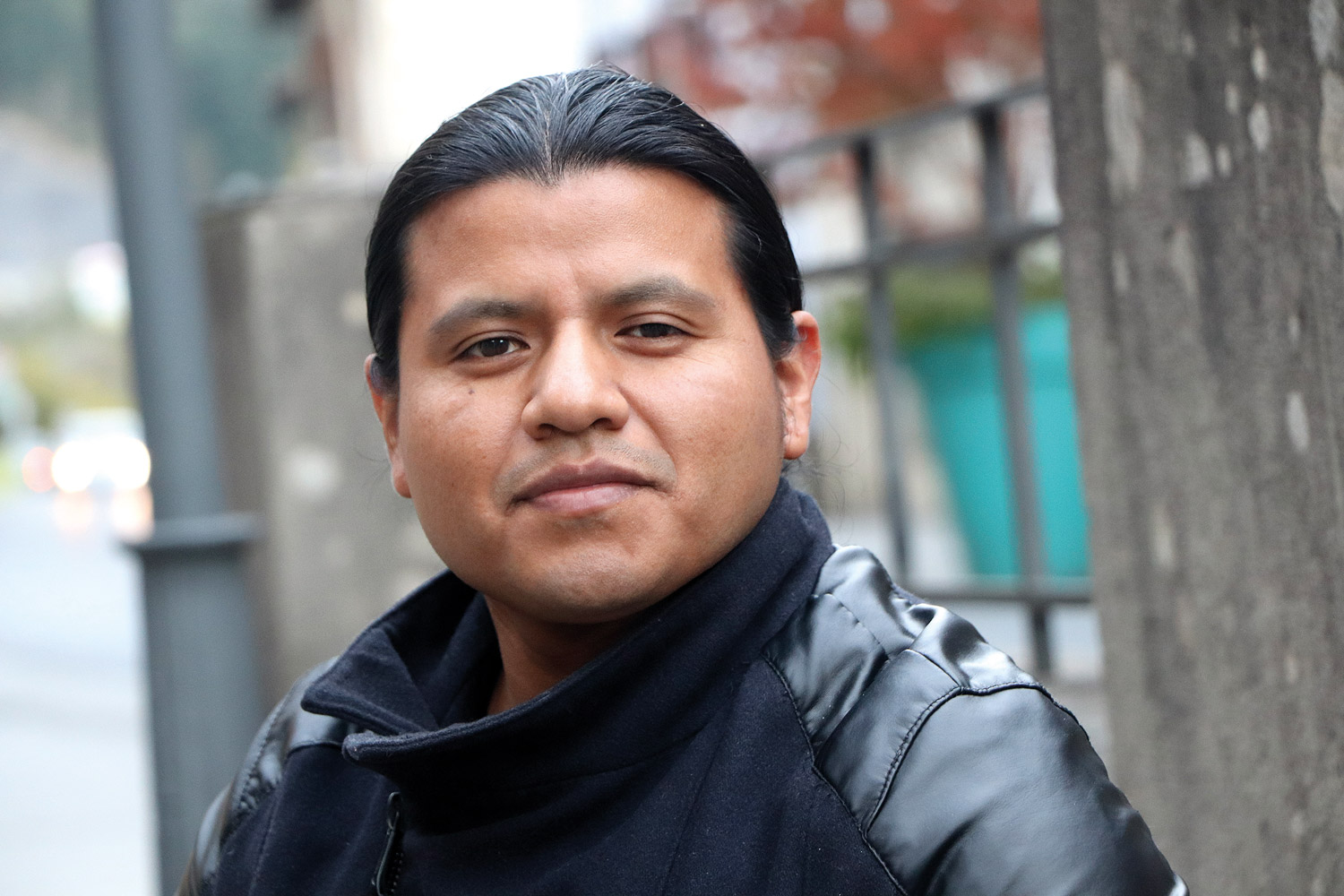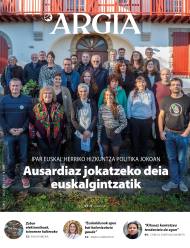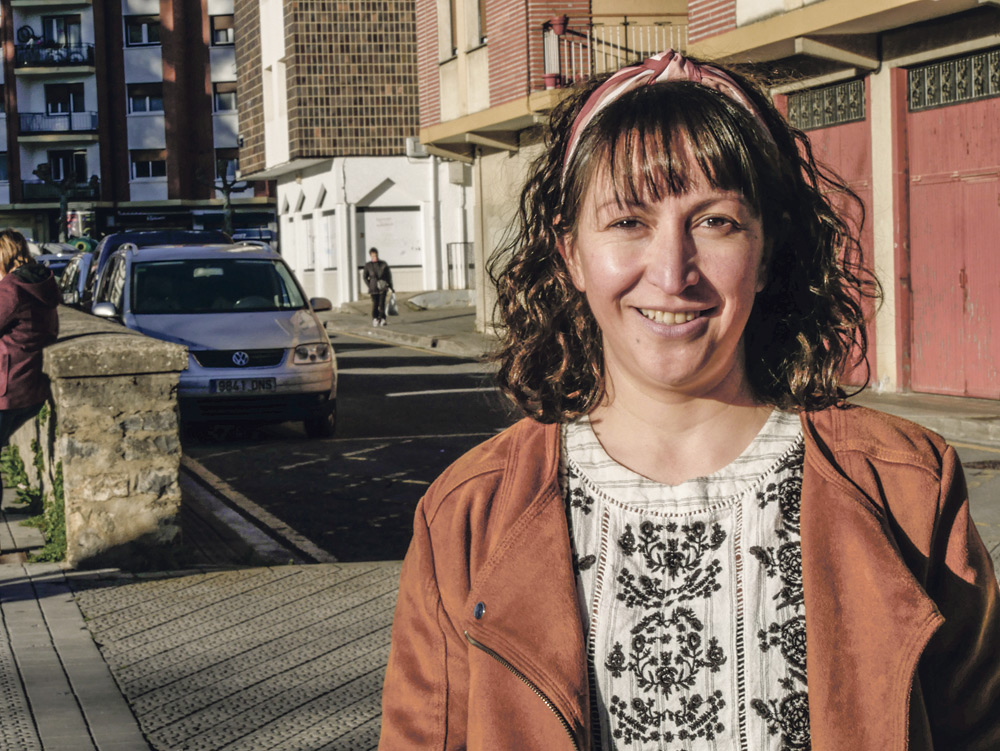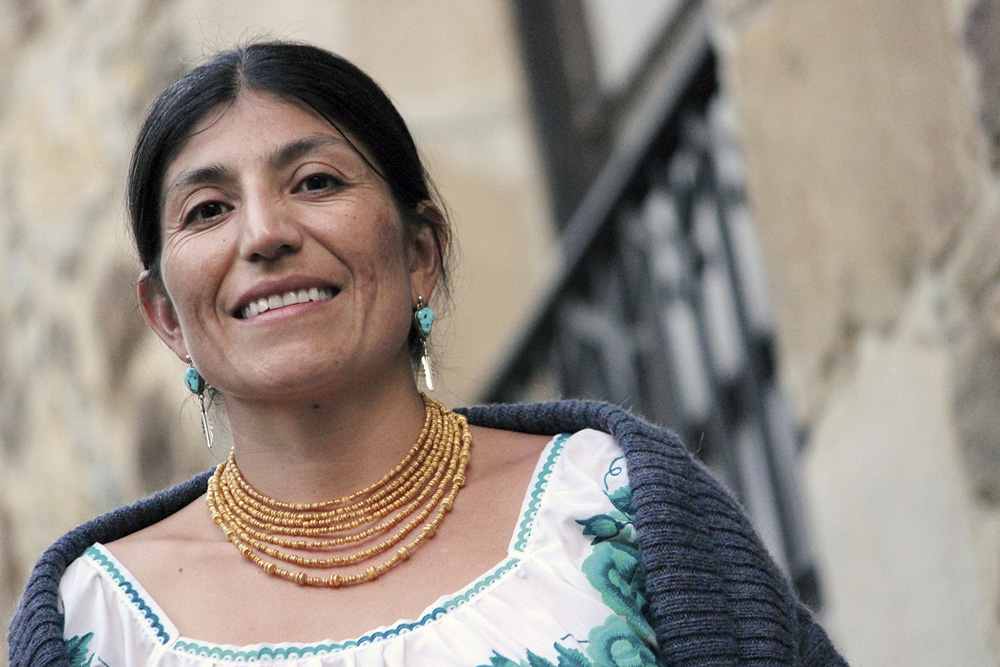"What identity is that without your own language?"
- Quechua Carlos Santiago Moreta is currently speaking. He was born in the Ecuadorian town of Otavalo, province of Imbabura. He entered the Kitxua Youth Association of Imbabura when he was young. There he realized the importance of language. The indigenous did, but did not speak the language of the house. He started speaking at the age of 12 and is currently working hard to revitalize the language.

From 2 October to 9 November, sixteen representatives of twelve minority languages carried out the Garabide Association Expert Training Programme at Aretxabaleta (Gipuzkoa). Most of those in Central and South America, also in Africa. At the end of the stay, the colleague from Ecuador informed us of quechua.
Carlos Santiago
Moreta... next Cachiguango, quechua native. In Ecuador there are not many Quechua surnames, but some do. I was born in the province of Imbabura, in the municipality of Otavalo, which was also called Sarance, but is Otavalo since the conquest. I live in San Juan de Luz, from Otavalo. Born in 1986, I'm training in Social Communication, because for 15 years I've had a hobby for radio and communication. The trend comes from my father, who was passionate about radio.
What path has he followed in relation to Quechua?
I went as a kid to AJQI, the Kitxua Youth Association in Imbabura. The association had and has several projects for the promotion and/or recovery of the cultural identity of the Quechua people of Otavalo. In my case, as soon as I entered the partnership, I was caught up in the linguistic question. I'm indigenous, but I didn't speak Quechua. Parents talked, but only in part. They made a “strategic” use of the language, as for something private they went to Quechua. I think it was a consequence of the domination of the conquest, of the old slogans: “Quechua has sinned to speak... Talking about quechua is a fine, a prison sentence…”. Always.
"I think we're going to get the quechua right, after we're here, working more effectively."
But did you know that environment? Is it still current?
I know that environment only in part. However, I remember once I went to the city to pick up a school [Otavalo] and, as I entered the city center, I saw some mestizos who spoke Spanish violently treating an indigenous man because he was talking about Quechua. The place was a focus of attention and, above all, the elderly went to it to ask, for example, for the interruption of the electric service. The truth is that those mestizos were mistreating that indigenous: “Kitxua language here is not worth you, it speaks Christian!” For me, that violence was new and surprised me. They came home, told what they had seen my parents, asked about their experiences when we were near the tulpa [low fire] and told me what they had known on their skin. As a young man, they worked on the farm and had a strong sour reality. So he didn't treat the butlers, or the bosses well either.
You are indigenous, but you underlined above that you did not speak of quechua...
Indeed. When I was 12, I started studying thanks to the Kitxua Youth Association. I used to talk a lot to my mother of Quechua. With my father, always in Spanish, but I really wasn't Castilian, but a chapushca, a mess. When I entered the Youth Association, I realized that the goal was to deepen cultural identity. And, of course, within that identity are language, clothing, customs, dance, music… The main driver of this purpose, and the first professor of Quechua was Gonzalo Diaz.Esa was the vision: to do all the radio programs with Quechua. As for language learning, we had a couple of classes on the weekend. It was indigenous, but until then the professor considered that Quechua was not.
And how did you think Quechua?For example,
in the association several Quechueros spoke, but they lived timid to speak, in fear to speak on the street. They had a hard time talking about Quechua on a radio show. I remember then I decided and said: “I want a radio show to talk about quechua.” And I wasn't able to speak well, but still, I started. And gradually I trained to talk about Quechua, and I overcame anyone's embarrassment and suspicion, and I made the program. I went back to the roots, I thought it was important: I was indigenous, I was wearing the local clothes, but I didn't talk about Quechua. So what identity is that without language?
.jpg)
What is the knowledge of Quechua in Ecuador? The greatest
knowledge is concentrated in the four indigenous peoples of the Northern Andes: Otavalo, Karanki, Natgrandma and Kayambi, in the provinces of Imbabura, on the border with Colombia. It's where most Quechua talk. In the Andes, but in the south, there are more people talking about Quechua. As far as I am concerned, 60% are Quechua speakers, but I have told you, the shame of one, the fear and the fear of another, speak much less. I, for example, talk about quechua with the elderly in my village, in San Juan de Luz. But then to the city, and although I don't speak correctly in Spanish, I speak in Spanish.
What legal recognition does your language have?
No recognition. In the 2007 Constitution, Ecuador was considered a multi-cultural and multi-cultural state, recognizing our language as an official status. It is the time when socialism spread to Venezuela, Bolivia and other countries. This recognition of quechua did not come without it, but some of our political institutions – Conaie, Ecuaruna, Χ… – sought to achieve that objective. These political institutions are responsible for the Ecuadorian Government developing policies in favour of peoples and nationalities. The government then managed to make Quechua an official language, and since then there has been the official language in the Constitution and in documents such as paper. But only on paper, because that has not had consequences in reality, there is no queue. Unfortunately, what has been promised has not materialised: everything is a word, no act.
What is the transmission of Quechua on the
knees?In our party transmission is only 30%-40%. Many of my premiums – I am referring to the group of twenty people – do not talk about Quechua, or speak half-heartedly, timid – if you are going to speak correctly, if someone is going to mock you. This complex is widespread among young people. Half bad, we already have musical groups singing with quechua, they're trends, and they reach those young people who speak Quechua with their songs uncertain. We intend to take advantage of this.
Does Quechua have access to education?
A few years ago, within the Ecuadorian Government, we had a ministry like that of Bilingual Multicultural Education. This led to a provincial direction that promoted quechua teaching in schools. The Ministry established the presence of quechua teachers. However, the current government has tried to avoid the good intentions of the previous ministry. Seeming help, yes, but doing nothing in cinemas and mines. Or on the one hand, and on the other hand, dismantle. That is, acting in contradiction. Unfortunately, that ministry was dismantled, that intention to teach Quechua merges into the educational system. Since then, there are no programs to teach Quechua to children. In the indigenous communities there are some schools, but only to translate from Spanish to Quechua a few words. There's no quechua teaching.
"Little by little I trained to talk about Quechua, and I overcame anyone's embarrassment and suspicions and made the radio show."
And in the media? Is there a quechua press or television? The
Kitxua Youth Association has a radio station, fully kitxua, and various cultural programmes. Also a magazine. We are counting on the linguistic situation we have experienced in the past and, with it, that of now: we are talking about musical groups singing with Quechua, we put their music, we are listening to children who speak with Quechua… We have been working on the radio for twenty years and it has not been easy. On the other hand, we have always thought that we are an alternative means of communication, linked to the community, to lobbyists and to children, because that Youth Association to which I have referred also requires it in its clauses. And so we've always been identified as alternatives. And besides us, there's no other radio that's talking about Quechua, that's doing our same job. We, however, want to take our linguistic and cultural project further, and to reach other media, whether private or commercial.
And have you managed to take it further?
We have tried to do so, but those media do not matter more than quechua, money. In our own province, for example, there is another radio station, which has the same programming grid as we do, but unfortunately, when we have met them, to reach agreements to promote Quechua, for example, the usual thing: “And in exchange for promoting Quechua, will they give us money?”… As for television, unfortunately, we do not have Quechua. The Universidad Técnica del Norte has a governmental and regional television channel. As a university, its contents are also academic. Unfortunately, there is no quechua television for people.
And in information and communication technologies, has Quechua taken place?As far as
digital is concerned, today content is being created and there are some: “And how do you say with quechua?... Shuc. And how do you say two? Ishkay… Continue on our social networks!” And it is. It's also trend, everybody does. In that we are, and come here, seeing your country, seeing the media, and I was surprised by what has been seen: the structure of your broadcasters, the strength to revitalize the language, the will to maintain the Basque… We just took and would take the model from here to our country, applying it there. It's not going to get from one day to the next, but at least I'd like to start channeling.
What have you seen during your stay with
us?In Euskal Herria, everything is articulated, there are actors and everyone has their space. It cannot be compared to our country. If we want to present and develop a linguistic project, and ask the government for help, I don't know if we had achieved anything. Words yes, “plurilingualism”, “multiculturalism”… but in reality, nothing less than nothing. However, a curiosity: on 12 October, when we were at Aretxabaleta, we received news from Ecuador saying that Imbabu's prefetura published a note saying that Quechua was considered an official language in the prefecture. She took care of me: for the first time in history, they made a similar decision in my province. This official recognition of our language is obviously due to the work of AJQI and other driving associations.
In the workplace, business, sports...
Without quechua, by desgracia.Es the first time you have in Garid, but we have met
more than one member of your community in the Expert Training program… I tell you in the movies that one is that someone tells us what here and another, which is very different, you see it in
your sight. It's totally motivating. I've learned a lot, how to make sense of what we do, how to channel the process, how to develop it, how to articulate all things, how to account for the possible ways of revitalizing and promoting Quechua… Because yes, we talk about Quechua, almost without thinking, but it's more than a question of how to inherit the language, how to transmit, how to ensure use… The work we do here has taken a different meaning, and I think we'll have been right now.
“Esperientzia berezi bat izan dut hemen egon garen bitartean. Garabidek zirkura eraman gintuen: Euskal Zirkua. Euskaraz! Hunkigarria izan zen! Hitzak ez ulertuta ere, ongi sentitu nintzen: etxean. Emozio bat izan zen, esplikaezina. Eta kale izenak euskaraz ikustea, edo euskaraz eta gaztelaniaz, eta Bilboko manifestazioaren irudiak… Ez nintzen han izan, baina irudiak ikusi nituen, eta nire Whatsappean jarri nituen, nire lagun Ekuadorrekoek ikusteko, galdera eginez: ‘Noiz elkartuko ote gara denok, gure anai-arreba euskaldunak bezala, gure hizkuntzaren alde, kitxuaren aldeko manifestazioan?’. Eta hainbat mezu jaso nituen, harriturik nire lagunak: ‘Eta hizkuntzaren defentsan irten dira horiek denak? Hainbeste jende?’… Sei aste izan dira Euskal Herrian, baina zenbat ikusi dudan, eta zenbat ikasi! Ekuadorrera itzuli, eta egingo dudan lehen gauza izango da kitxuaz ari diren musika taldeekin biltzea –goraldian baitaude–, eta gazteetara hurbildu, eta eduki berriak asmatu… Hamaika gauza bururatzen zaizkit, baina, azkenean, dena gauza bat besterik ez da: dena kitxuaz egitea, kitxuaz kontsumitzea, kitxua estimatzea…”.















